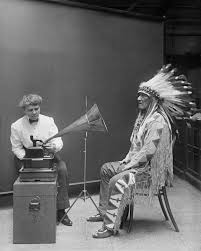Colloquial Traits in Tribal Regionalism
Often I sit here in front of this computer and think about how to capture the voice of a narrator. Voice is the darkness around the thief, his soft footsteps, and his choice of victim. There is nothing innocent about what we writers do. We're persuasive colonizers seeking to intrude on your sensibilities. We're convincing--softly so. When I read passages from Faulkner's work and observe the way he captured southern diction, I can't help but be humbled. The small pauses and grand judgements alike--all are done with a slight of hand I wish to master.
When I read passages from Faulkner's work and observe the way he captured southern diction, I can't help but be humbled. The small pauses and grand judgements alike--all are done with a slight of hand I wish to master.
“In a strange room you must empty yourself for sleep. And before you are emptied for sleep, what are you. And when you are emptied for sleep, what are you. And when you are emptied for sleep you are not. And when you are filled with sleep, you never were. I don't know what I am. I don't know if I am or not.” ― William Faulkner, As I Lay Dying
I've taken the task to implement something similar with my two tribal communities. I've sought to capture the way Kiowa and Cherokee people speak as the chosen "voice" for my narration. Why? It's not just because I was raised in these two communities, but that is a major reason. When you grow up between two tribal cultures, especially two which are historically set in two different landscapes (southern plains versus mountain/hills), you can't help but recognize the beautiful differences.My writing has always attempted to disrupt the homogenous stereotype of Native people belonging to the same culture (and often a culture perceived to be plains). It's important to know there are unique differences between each tribal culture and we are brought together by a common and shared history of colonialism. The continued struggle against this colonial force has further fused our identities in a universal Pan-Indian construct. But the differences in our languages, dances, songs, customs, social etiquette hasn't vanished.In the case of my writing, we can also include colloquialism.Kiowa and Cherokee people share colonial boundaries by having been transplanted into what was formerly known as Indian Territory (the largest prisoner of war camp in recorded history), which is now Oklahoma. Kiowa people live on the southern plains while Cherokee people live in Ozarks. But both tribes are in Oklahoma. Not only are my tribes divided by geographical topography but also language, culture, and tribal history. Before the reservation era, Kiowa people were nomadic and situated in a warrior culture (a part of a tribal plains coalition which held off the U.S. government from westward expansion for over 100 years), and Cherokee people were agrarian mountain people (who spear-headed major legal battles with the U.S. government generations before plains Natives seen their first U.S. soldier). As a writer, my attempt is to show this distinction by way of vernacular. In the way you read Faulkner's representation of Southern culture in the above passage, I take the Oklahoman way in which Cherokee people speak that's indicative of small towns in the Ozarks of northeastern Oklahoma and northwestern Arkansas. To contrast, I take an Indigenized English through Kiowa language to capture how tribes on the southern plains speak.Below I give an example from two different short stories. Time Like Masks (published in South Dakota Review) captures the Okie twang that is characteristic of how Cherokee people speak in my community of Tahlequah. Our Dance (published in American Short Fiction) captures an Indigenized English which is not only indicative of how Kiowa people speak, but Comanche and Apache on the southern plains.Cherokee/Tahlequah:
As a writer, my attempt is to show this distinction by way of vernacular. In the way you read Faulkner's representation of Southern culture in the above passage, I take the Oklahoman way in which Cherokee people speak that's indicative of small towns in the Ozarks of northeastern Oklahoma and northwestern Arkansas. To contrast, I take an Indigenized English through Kiowa language to capture how tribes on the southern plains speak.Below I give an example from two different short stories. Time Like Masks (published in South Dakota Review) captures the Okie twang that is characteristic of how Cherokee people speak in my community of Tahlequah. Our Dance (published in American Short Fiction) captures an Indigenized English which is not only indicative of how Kiowa people speak, but Comanche and Apache on the southern plains.Cherokee/Tahlequah:
"Come to find out, he was the grandson to my aunt Josie, who was the sister to my mother, Leanna. According to Cherokee clan customs, Carl was a nephew, a nephew through a first cousin I hardly knew. Guess that was how relations grew as old got older—more years, more kin. My aunt Josie went and married a Kiowa and spent most of her days living in southern Oklahoma; I never visited so I hardly seen my cousins, much less their kids. Carl, on the other hand, made himself known to me in a peculiar way. Unlike others, I listened to him, and you might say, at least how I figured, he baffled everyone." --Oscar Hokeah in Time Like Masks
Kiowa/Lawton:
"Gaa, we were just little guys, around a year old, when Kiowas started getting that ahongiah back in ’76, no, maybe in ’77. It was the coalition of Kiowas, Comanches, and Apaches that leased a tract of land to Fort Sill military base for one hundred years. Good thing, too, because us Kiowas divided our share of the money between all tribal members, fifteen hundred a piece. Those of us under the age of eighteen had our money held in trust, growing interest until our day. We were the last in our families to walk through the front doors of those cookie-cutter homes to hear our mothers say, 'Your per cap check is on the table.'" --Oscar Hokeah in Our Dance
The trick isn't just to capture the nuances in the speech pattern, but to also transfer it to literature. When we tell a story face-to-face we're filled with excessive pauses and added words to fill time and space for us to think as we speak. When transforming a vernacular to the page, you must take out enough and leave in enough to capture the intended identity. This is not easy. It took me years to find the right balance.But all this goes toward showcasing the beautiful differences between Kiowa and Cherokee culture. There are a number of other things I do--some obvious and some subtle--to further capture the difference, but this post is about voice so I wanted to speak directly about vernacular in my tribal communities and in my writing. As we move to an appreciation of diversity in America, we can further appreciate the complexity of tribal cultures.The two above examples are a part of my novel-in-stories, Unsettled Between. I'm deep in a final revision right now and tightening up character and voice. The novel is narrated by twelve different family members and focuses on the transformation of one character, Carl Geimausaddle. Like so many of us, Carl wants the freedom to be his own person, to shape his own identity. He attempts to do so by leaving his family and rejecting his Kiowa and Cherokee communities. But will life struggles allow him his freedom? Unsettled Between examines how identity is at the mercy of community and the inseparable bond we have with the people who love us the most.Unsettled Between is Rep'd by Allie Levick of Writers House Literary Agency.
Support a Native owned Etsy shop, Allies United, where I offer unique merch for allies of social justice movements, like MMIW, Native Lives Matter and Black Lives Matter. Take a look inside my Etsy shop here: etsy.com/shop/AlliesUnited.